Dear Germanee,
wie geht es Dir? I hope everything is well at your end.
Today, I’m going to continue with the 6th verb of my 26 + 2 series and so we’re getting to the letter “E”.
Welcome, welcome to part 6!
Bist du bereit? Are you ready?
Have you read the d-post, which introduces you to the verb denken?
No? Not yet? Then, you can find it here: http://26-2-german-verbs-in-action-part-5
The e-verb, I want you to learn is … ta-daaaaaa:

Another essential one, I suppose.
And since essen is such an important and life-saving action, this verb deserves kind of a high-maintenance-treatment.
Let’s see:
|
Verb basic form |
Singular |
Plural |
||||
|---|---|---|---|---|---|---|
|
ich I |
du you informal |
er/sie/es he/she/it |
wir we |
ihr you |
sie/Sie they/you formal |
|
|
essen |
esse |
isst |
isst |
essen |
esst |
essen |
Now, you know, what I mean by high- maintenance, don’t you? As you can see, the verb essen changes its first letter from “e” into “i” in the second and third person singular. That’s something you should just learn by heart. Ich denke, since you’ll use essen quite often, you’ll remember it easily.
Have you actually noted already, how different we pronounce the “e” and “i” in German, compared to English?
While our German “E” is spoken like the “e” in the English word bed, the “I” in German is pronounced like the “ee”-sound in the word beef.
Please, all Germanees out there , would you keep that in mind?
Let’s now practice how you can use the verb essen in action.
Therefore, we’re going back to the Italian restaurant and to Shireen and Lukas, that newly in love couple from the previous post.
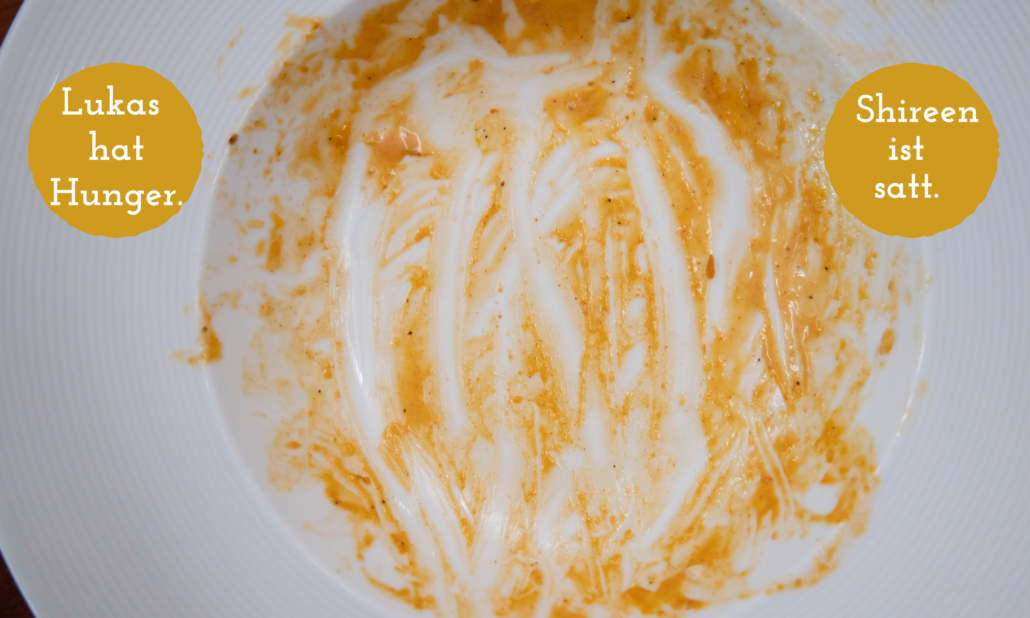
Shireen and Lukas ordered Shrimps and Pasta. Shireen had already bred and olive oil since she was starving.
| KELLNER waiter | So, bitte sehr! Hier sind die Shrimps und auch die Pasta. Wer isst was? There you go. Here are the shrimps and also the pasta. Who eats what? |
| SHIREEN | Am besten alles einfach in die Mitte, bitte! Sharing is caring. Wir essen alles zusammen. Oder, Schatz? The best (will be) everything in the middle, please! Sharing is caring. We eat everything together. Don’t we, darling? |
| KELLNER | Perfekt. Guten Appetit. Perfect. Enjoy. |
| LUKAS | Vielen Dank! Wie lecker. Guten Appetit. Thank you very much. How yummy. Enjoy. |
| LUKAS | Hey Shireen! Isst du immer allein? Ich denke, sharing is caring und wir essen alles zusammen? Hey Shireen! Do you always eat alone ? I think, sharing is caring und wir essen everything together? |
| SHIREEN | Mhhhhm. Uppps! Ach, Lukas … das tut mir wirklich so, so leid. Ich bin immer noch hungrig und ich esse immer sehr schnell. Mhhhm. Uppps! Ahhh, Lukas … I’m really so, so sorry. I’m still hungry and I always eat very fast. |
| LUKAS | Najaaa … ich esse einen Shrimp und du isst zehn. Ich esse eine Spaghetti und du isst sie alle. Jetzt bist du satt und ich sehr hungrig. Mhhmpf … I eat one shrimp and you eat ten. I eat one spaghetti and you eat them all. Now you are full and I am very hungry . |
| SHIREEN to the waiter | Entschuldigung, haben Sie vielleicht noch einmal Brot und ein bisschen Olivenöl für uns? Es ist wirklich dringend. Die Liebe meines Lebens verhungert. Excuse me, do you have maybe again bred and some olive oil for us? It’s really urgent as the love of my life is starving. |
| LUKAS | Shireen, du bist unglaublich. Ich denke, nächstes Mal essen wir in einem Restaurant mit Buffet. Dann ist alles gut zwischen uns. Shireen, you are unbelievable. I think, next time we’ll eat in a restaurant with buffet. Then all is good between us. |
| SHIREEN | Ach, Lukas! Du bist so klug. Oh, Lukas. You are so smart. |
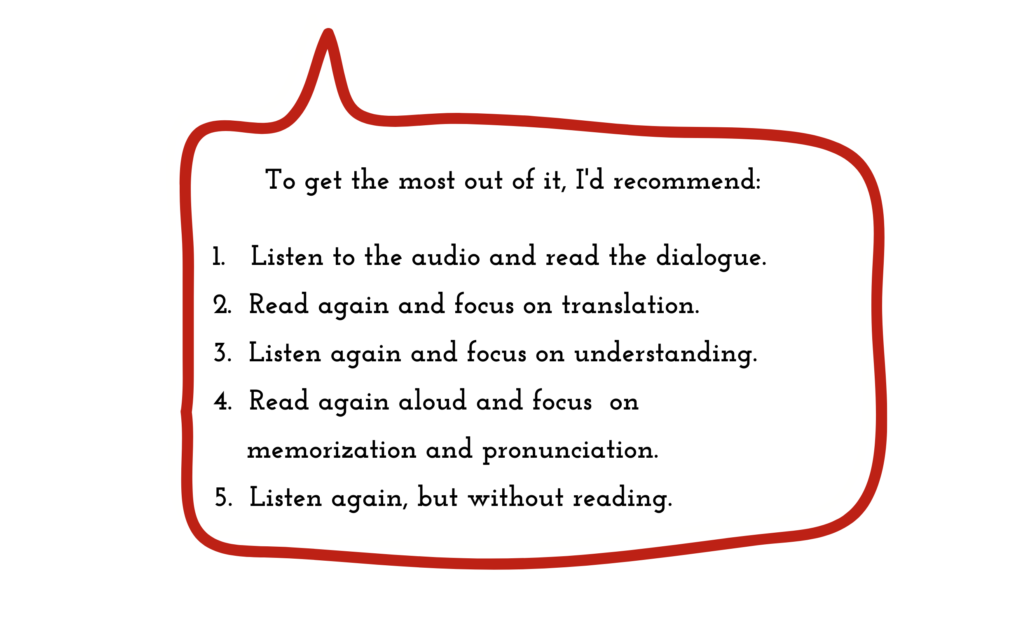
Dear Germanee, hast du jetzt auch Hunger?
Was isst du gern?
Und was isst du nicht gern?
It would be lovely if you could leave me a comment below – in German of course! – about your food favorites and your absolutely no-go-foods.
Ich esse sehr gern … / I like to eat … very much.
Ich esse überhaupt nicht gern … / I do not at all like to eat …
Since I gave you already some insights into the German world of bakeries (26 + 2 GERMAN VERBS IN ACTION | PART 3), I’m now going to talk about the second very serious and absolutely basic essence of the German nutrition, aside from Brot.
Guess what?!
… die Kartoffel
I don’t know why German cuisine is so under-rated. Typical German dishes are mostly quite hearty, regional and seasonal. Not that bad, right? Due to hard circumstances German population was facing, in terms of climate and hard work, up to the 1960ies, people really needed that kind of powerful fuel to maintain high caloric intake. I’m sure you’ve heard, how much we Germans love Kartoffeln, our potatoes. Rumor goes that some people out there in the world, even refer to Germans as “Kartoffel”.
Is that really true?!?
Picking the right sort of potato to match a certain dish is almost science. Depending on their texture, they’ll later turn out as of more creamy or crumbly consistency. To differentiate them, our Kartoffeln got beautiful names, such as Annabelle, Sieglinde or Laura. There are more than 2,000 different types out there and in Germany alone grow approximately 210 sorts.
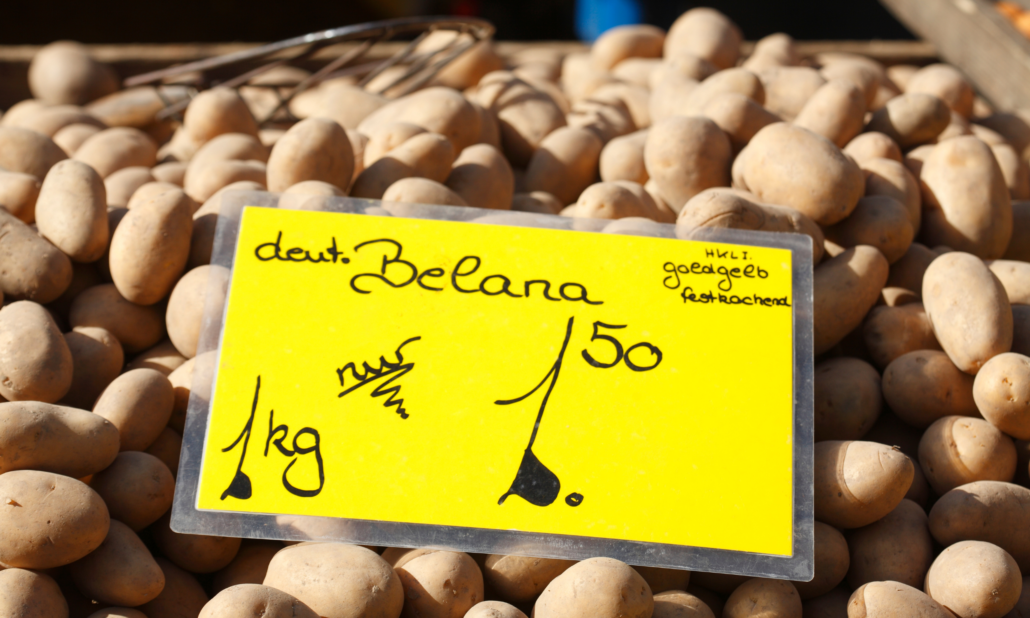
To be honest, the word Kartoffel reminds me of some of the worst moments of my childhood. On Saturdays or Sundays, punctually at noon my mom used to call me resolutely, in her hands an orange plastic bowl which she handed out to me. No further words were needed. If I dared to roll my eyes she raised her hand with the bowl. No further movements were needed. I knew my scary duty: Going down into the cellar to pick Kartoffeln for our weekend lunch.
In the darkest spot of our dark cellar, was a section with a huge heap of potatoes, delivered in autumn and in such a high amount to make sure it’ll feed us for almost all year around. I hated the cellar because of its smell and its scary spiders. I hated the potato heap because of all its disgusting surprises. The further the year went on, my hands felt more and more of those wrinkled, shriveled and sprouted little potato beasts. Some of them just got wither, but others even became muddy and stinky. Just now, the question occurs to me why no one handed me at least a flashlight to make my duty less challenging.
However, I still love potatoes in my pots and on my plate. But of course, essen in Germany is not all about Kartoffeln.
Dear Germanee, I apologize for swooning out so elaborately. Most probably my writing took that potato-direction as I’m in Dubai right now and fresh, young potatoes is definitely something I miss here, especially at this time of the year.
It’s Spargel-Zeit, asparagus season, in Germany. Depending on the weather, Spargel-Zeit goes from late April till beginning of June. Then you can buy delicious white asparagus on every farmers market. With some new potatoes and just a little bit of heated butter, it already makes a wonderful and healthy meal. Oh yeah, I can hear the mumbling of all meat-lovers … and what about Schnitzel?!? Ok, you could – of course – add a Kalbsschnitzel, veal cutlet, to that dish if needed.
However, a trend has appeared few years ago towards German cuisine, with a strong awareness of ethical and environmental issues. The new chefs rely on sustainably grown, regional products to acknowledge the unique tastes of German rooted dishes by combining them with spices and certain ingredients from all around the world which not only results in fantastic flavors, but also reflects and honors the roots of all the “new Germans”.
What I personally like a lot about this movement, aside of the ecology, is the more laid back mentality in these restaurants: You can have exceptional delicious food without a stiff, formal etiquette.
If you’re curious to get a better idea, just check out these restaurants:
In Berlin: https://www.nobelhartundschmutzig.com/en/# oder https://www.ernstberlin.de
In Hannover: https://www.jante-restaurant.de/en/index.html oder https://www.11a-restaurant.de
Ohhh … jetzt habe ich ein bisschen Heimweh und auch Hunger, now I’m feeling a little homesick and hungry too.
In that case comfort-food can lift my spirit. I’ll cook a nice potato-soup, eine Kartoffelsuppe, based on a recipe,
recently revealed by German chancellor Angela Merkel.
Maybe you’ve heard that Mrs Merkel usually keeps private life private. Therefore it was quite a thing when she shared her secret tip how to prepare die perfekte Kartoffelsuppe.
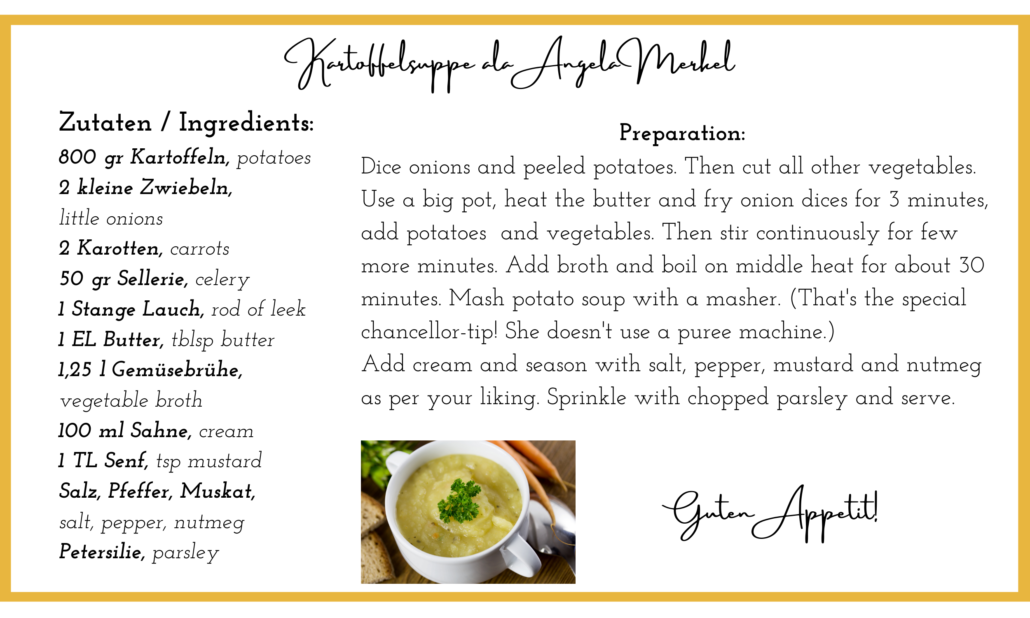
Hab einen wunderbaren Tag and please let me know how did you like die Karoffelsuppe!

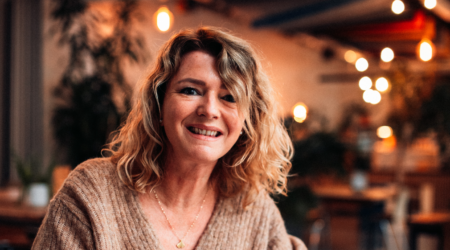


Leave a Reply
Want to join the discussion?Feel free to contribute!